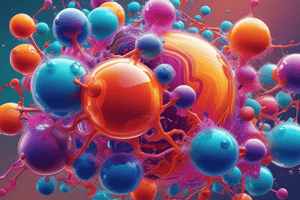Podcast
Questions and Answers
What differentiates chemical changes from physical changes?
What differentiates chemical changes from physical changes?
- Physical changes alter the chemical composition while chemical changes do not. (correct)
- Physical changes involve energy transfer while chemical changes do not.
- Chemical changes only involve changes in appearance while physical changes involve new substance formation.
- Chemical changes are reversible while physical changes are not.
Which of the following is an example of a physical change?
Which of the following is an example of a physical change?
- Mixing salt and water (correct)
- Rusting of iron
- Baking a cake
- Burning wood
What happens to the chemical composition during a chemical change?
What happens to the chemical composition during a chemical change?
- It remains the same.
- It transforms into a mixture.
- It forms new substances. (correct)
- It becomes less stable.
Which of the following is a reversible process?
Which of the following is a reversible process?
Which type of change involves the production of new substances?
Which type of change involves the production of new substances?
Which type of change typically affects the matter's chemical composition?
Which type of change typically affects the matter's chemical composition?
What is the key difference between physical and chemical changes with regard to reversibility?
What is the key difference between physical and chemical changes with regard to reversibility?
Which process involves the breaking down of a complex substance into simpler substances?
Which process involves the breaking down of a complex substance into simpler substances?
What is the main characteristic that distinguishes chemical changes from physical changes?
What is the main characteristic that distinguishes chemical changes from physical changes?
Which type of change involves alterations in matter but does not produce new substances?
Which type of change involves alterations in matter but does not produce new substances?
Flashcards are hidden until you start studying
Study Notes
Title: Understanding Changes in Matter: Exploring Physical and Chemical Changes
Changes in matter refer to the transformations that occur when substances undergo alterations in their chemical composition, physical properties, or both. In this article, we will delve into the fascinating world of physical and chemical changes, exploring the differences between the two and how each impacts matter.
Physical Changes
Physical changes are alterations that occur without changing the substance's chemical composition. Rather, these changes merely change the appearance, physical state, or arrangement of particles within matter. Examples of physical changes include:
- Melting: When a solid becomes liquid, such as ice turning into water.
- Solidification: When a liquid turns into a solid, like water freezing into ice.
- Expansion: When a substance increases in size due to changes in temperature or pressure, such as a gaseous substance being compressed.
- Dissolving: When particles from one substance mix with those from another, without forming a new compound.
Physical changes are typically reversible, meaning that the original matter can be returned to its original state upon removing the stimulus causing the change.
Chemical Changes
Chemical changes, on the other hand, involve alterations in a substance's chemical composition. During these changes, new substances are formed, which often exhibit different properties than the original matter. Examples of chemical changes include:
- Combustion: When a substance reacts with oxygen to produce carbon dioxide and other gases, like burning wood to produce carbon dioxide, water vapor, and heat.
- Oxidation: When a substance loses oxygen, such as rusting iron or apples turning brown.
- Decomposition: When a complex substance breaks down into simpler substances, like the rotting of organic matter.
- Synthesis: When two or more substances combine to produce a new compound, like sodium and chlorine forming sodium chloride (NaCl) when mixed together.
Chemical changes are generally irreversible, as the original substances are no longer present once the change has occurred.
Comparing Physical and Chemical Changes
While both physical and chemical changes involve alterations in matter, there are several key differences between the two:
- Physical changes do not produce new substances, whereas chemical changes do.
- Physical changes typically do not affect the matter's chemical composition, while chemical changes do.
- Physical changes are usually reversible, whereas chemical changes are typically irreversible.
In summary, changes in matter can be broadly categorized into physical changes and chemical changes. These changes can impact the appearance, physical state, and chemical composition of substances, providing a valuable understanding of how our world functions at the molecular level. Whether it's melting ice, rusting iron, or combusting fuel, the knowledge of these changes helps us understand the world around us and allows us to make informed decisions about the substances we interact with daily.
Studying That Suits You
Use AI to generate personalized quizzes and flashcards to suit your learning preferences.



